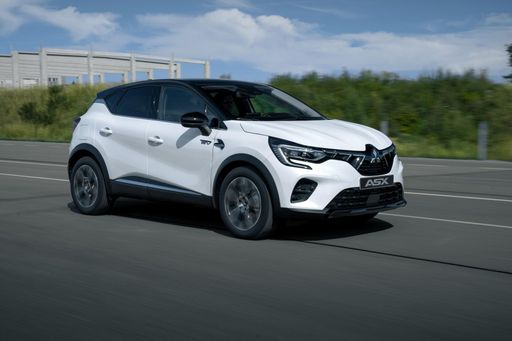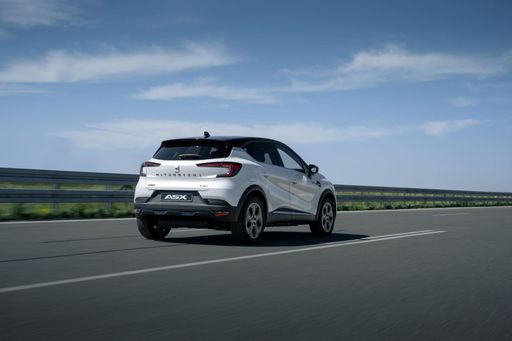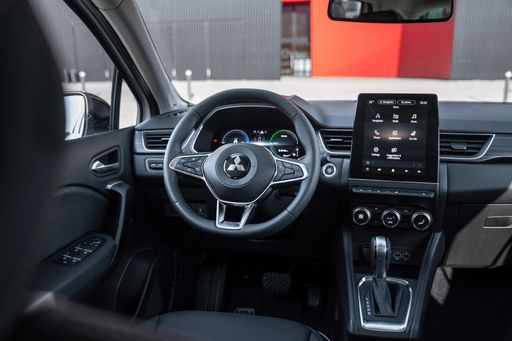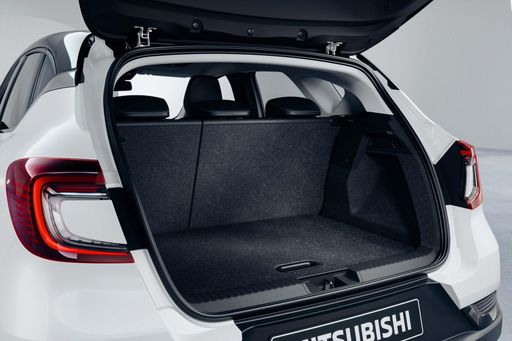Mitsubishi ASX VS Maxus Deliver 9 – Specs, Efficiency & Price Comparison
Which model is the better choice – the Mitsubishi ASX or the Maxus Deliver 9? We compare performance (158 HP vs 204 HP), boot capacity (484 L vs ), efficiency (4.60 L vs 26.20 kWh8.80 L), and of course, the price (20600 £ vs 38700 £).
Find out now which car fits your needs better!
The Mitsubishi ASX (SUV) is powered by a Petrol, Petrol MHEV or Full Hybrid engine and comes with a Manuel or Automatic transmission. In comparison, the Maxus Deliver 9 (Cargo Van) features a Diesel or Electric engine and a Manuel or Automatic gearbox.
When it comes to boot capacity, the Mitsubishi ASX offers 484 L, while the Maxus Deliver 9 provides – depending on what matters most to you. If you’re looking for more power, you’ll need to decide whether the 158 HP of the Mitsubishi ASX or the 204 HP of the Maxus Deliver 9 suits your needs better.
There are also differences in efficiency: 4.60 L vs 26.20 kWh8.80 L. In terms of price, the Mitsubishi ASX starts at 20600 £, while the Maxus Deliver 9 is available from 38700 £.
Compare all the key specs now and find out which model fits your lifestyle best!
Mitsubishi ASX
The Mitsubishi ASX presents itself as a compact crossover that combines practicality with style. Its sleek design and versatile interior make it an appealing choice for both urban and rural settings. With a focus on providing a comfortable driving experience, the ASX also offers a range of modern features that enhance connectivity and safety.
details @ Mitsubishi
@ Mitsubishi
 @ Mitsubishi
@ Mitsubishi
 @ Mitsubishi
@ Mitsubishi
 @ Mitsubishi
@ Mitsubishi
Maxus Deliver 9
The Maxus Deliver 9 presents itself as a robust and versatile vehicle, perfectly suited for both urban and rural deliveries. With a spacious cargo area and a modern cabin equipped with advanced technology, it caters to the needs of both driver comfort and logistical efficiency. Its sleek design and reliable performance make it an attractive option for businesses looking to upgrade their fleet.
details

|
|
|
|
|
Costs and Consumption |
|
|---|---|
|
Price
20600 - 32000 £
|
Price
38700 - 60200 £
|
|
Consumption L/100km
4.6 - 6 L
|
Consumption L/100km
8.80 L
|
|
Consumption kWh/100km
-
|
Consumption kWh/100km
26.2 - 30.8 kWh
|
|
Electric Range
-
|
Electric Range
287 - 358 km
|
|
Battery Capacity
0.60 kWh
|
Battery Capacity
-
|
|
co2
105 - 135 g/km
|
co2
0 - 231 g/km
|
|
Fuel tank capacity
48 L
|
Fuel tank capacity
-
|
Dimensions and Body |
|
|---|---|
|
Body Type
SUV
|
Body Type
Cargo Van
|
|
Seats
5
|
Seats
3 - 7
|
|
Doors
5
|
Doors
4
|
|
Curb weight
1296 - 1501 kg
|
Curb weight
2360 - 2770 kg
|
|
Trunk capacity
348 - 484 L
|
Trunk capacity
-
|
|
Length
4239 mm
|
Length
5546 - 5940 mm
|
|
Width
1797 mm
|
Width
2062 mm
|
|
Height
1575 mm
|
Height
2525 - 2755 mm
|
|
Payload
399 - 449 kg
|
Payload
730 - 1140 kg
|
Engine and Performance |
|
|---|---|
|
Engine Type
Petrol, Petrol MHEV, Full Hybrid
|
Engine Type
Diesel, Electric
|
|
Transmission
Manuel, Automatic
|
Transmission
Manuel, Automatic
|
|
Transmission Detail
Schaltgetriebe, Automat. Schaltgetriebe (Doppelkupplung), Automatikgetriebe
|
Transmission Detail
Schaltgetriebe
|
|
Drive Type
Front-Wheel Drive
|
Drive Type
Front-Wheel Drive
|
|
Power HP
91 - 158 HP
|
Power HP
148 - 204 HP
|
|
Acceleration 0-100km/h
8.5 - 14 s
|
Acceleration 0-100km/h
16 - 19 s
|
|
Max Speed
168 - 180 km/h
|
Max Speed
100 - 160 km/h
|
|
Torque
160 - 270 Nm
|
Torque
330 - 375 Nm
|
|
Number of Cylinders
3 - 4
|
Number of Cylinders
4
|
|
Power kW
67 - 116 kW
|
Power kW
108 - 150 kW
|
|
Engine capacity
999 - 1598 cm3
|
Engine capacity
1996 cm3
|
General |
|
|---|---|
|
Model Year
2024
|
Model Year
2022 - 2024
|
|
CO2 Efficiency Class
D, C
|
CO2 Efficiency Class
G, A
|
|
Brand
Mitsubishi
|
Brand
Maxus
|
Mitsubishi ASX
The Mitsubishi ASX: A Modern SUV with Advanced Features
The Mitsubishi ASX continues to be a popular choice for SUV enthusiasts, combining sleek design, impressive efficiency, and innovative technology. The 2024 model year introduces an array of improvements, making it a worthy contender in its category. In this article, we will delve into the technical details and innovative aspects of the Mitsubishi ASX, presenting why it stands out in the SUV segment.
Sophisticated Powertrains and Efficiency
Under the bonnet, the Mitsubishi ASX offers a variety of powertrain options, catering to different driving preferences. Customers can choose from petrol engines, mild-hybrid systems, and full-hybrid configurations, balancing power and efficiency effectively.
The performance spectrum ranges from 91 PS to 158 PS, demonstrating the vehicle's versatility. With a fuel consumption of between 4.7 and 6 L/100km, the ASX effectively manages fuel efficiency without compromising on performance. The car's CO2 emissions range from 107 to 135 g/km, placing it within CO2 efficiency classes C and D.
Advanced Transmission Options
The ASX offers a mixture of manual and automatic transmissions to meet diverse driving needs. Its gearbox specifications include a standard manual option and automatic options such as dual-clutch transmissions, providing a seamless driving experience. Depending on the variant, the vehicle can accelerate from 0 to 100 km/h in as little as 8.5 seconds, reaching maximum speeds between 168 and 180 km/h.
Modern Design and Spacious Interior
Externally, the ASX reflects contemporary design aesthetics, with dimensions of 4239 mm in length, 1797 mm in width, and 1575 mm in height. Internally, it accommodates up to five passengers comfortably and offers a respectable boot capacity ranging from 348 to 484 litres. Despite its spaciousness, the SUV maintains an optimal weight between 1296 and 1501 kg, which aids in delivering its intended driving dynamics.
Safety and Technology Innovations
Mitsubishi prioritises safety and technology in the ASX. It is equipped with the latest driver-assistance systems, enhancing safety and convenience. The modern infotainment system integrates smoothly with smartphones, ensuring that connectivity is at the driver's fingertips. Moreover, various trimming levels such as "Intro Edition DCT" and "Top Automatik" allow customers to select features best suited to their lifestyle, from basic utilities to luxury enhancements.
Conclusion: A Balanced SUV Choice
The Mitsubishi ASX stands out as a well-rounded SUV choice for those who prioritise efficiency, reliability, and modern technology. Its array of powertrains, stylish design, and advanced safety features make it an attractive option within its price range of €23,990 to €37,390. The ASX's 2024 model reaffirms Mitsubishi’s commitment to offering innovative yet practical vehicles to the global market.
Maxus Deliver 9
A Versatile Workhorse: The Maxus Deliver 9
The Maxus Deliver 9 is rapidly gaining traction in the commercial vehicle sector. As a versatile and capable van, it meets the needs of a range of industries, providing both diesel and electric powertrains. The model year updates from 2020 to 2023 bring a host of technical advancements and innovative features that make the Maxus Deliver 9 stand out in its class.
Powertrain Options: Diesel and Electric
The Maxus Deliver 9 offers a choice between traditional diesel and modern electric powertrains. The diesel variant comes with a 2.0-litre engine, delivering 148 PS and a torque of 310 Nm. It is available with both front and rear-wheel drive configurations, coupled with a manual gearbox. These options provide robust and reliable performance for traditionalists who favour a dependable diesel setup.
For those looking to the future, the electric eDeliver 9 offers compelling specifications. With a power output of 204 PS and torque reaching 375 Nm, the electric version provides a silent and efficient drive. Battery capacity options cater to different needs, with ranges spanning from 265 km to an impressive 328 km depending on the chosen battery configuration. This makes the eDeliver 9 a viable choice for urban and regional deliveries.
Innovative Features for Enhanced Utility
The Maxus Deliver 9 is equipped with features designed to enhance practicality and comfort. With a payload capacity ranging from 630 to 1275 kg, it is well-suited for various commercial applications. The model’s dimensions and configurable seating options (accommodating between 3 to 7 passengers) add flexibility, making it ideal for both logistics and passenger transport roles.
Despite its work-focused design, the Deliver 9 doesn’t skimp on creature comforts. The cabin offers a modern infotainment system with touchscreen capabilities, providing intuitive control over navigation and connectivity functions. Advanced safety features, including lane departure warning and adaptive cruise control, are available, ensuring peace of mind for drivers and fleet managers alike.
Environmental and Economic Efficiency
In an era where sustainability is paramount, the Maxus Deliver 9 delivers low operating costs and reduced environmental impact, particularly in its electric form. The electric models boast zero tailpipe emissions and CO2 efficiency class ratings up to A, making them an attractive choice for green-conscious businesses.
From an economic standpoint, the electric variants also offer long-term savings through reduced fuel costs and maintenance requirements compared to their diesel counterparts. Initial pricing for the Deliver 9 ranges from €43,423 to €93,403, depending on the specification and powertrain, representing competitive value within the segment.
Conclusion: Meeting Modern Transport Needs
The Maxus Deliver 9 represents a compelling proposition in the commercial vehicle market. With its blend of diesel and electric powertrains, innovative features, and a focus on efficiency, it meets the diverse needs of modern businesses. Whether prioritising traditional power or embracing new technologies, the Deliver 9 offers a versatile choice that businesses can rely on for both present and future transportation needs.
The prices and data displayed are estimates based on German list prices and may vary by country. This information is not legally binding.
